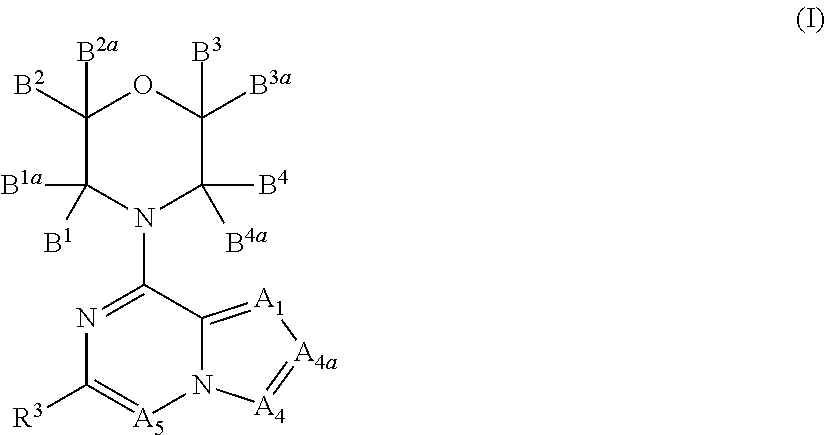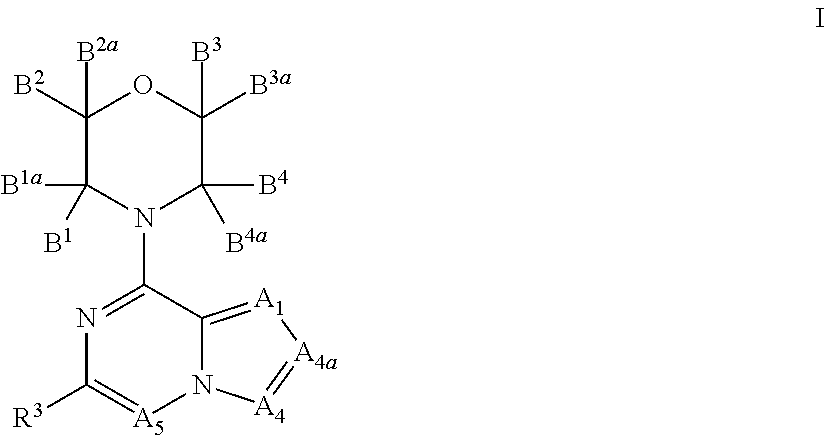Inhibitors of pi3 kinase
a technology of inhibitors and kinases, applied in the field of pharmaceutically useful compounds, can solve the problems of not revealing or suggesting any other 6,5-fused bicyclic compounds, documents that do not relate, and documents that do not relate, and achieves the effects of increasing in vivo half-life, facilitating preparation and detection, and reducing the risk of toxicity
- Summary
- Abstract
- Description
- Claims
- Application Information
AI Technical Summary
Benefits of technology
Problems solved by technology
Method used
Image
Examples
example b1
Preparation of Final Product 2-2
[0455]
[0456]To a mixture of intermediate I-8 (48 mg, 0.104 mmol, 1 eq.), indazole-4-boronic acid hydrochloride (27 mg, 0.136 mmol, 1.3 eq.), and PdCl2 (dppf) (9 mg, 0.010 mmol, 0.1 eq.), in DME (1 ml), a saturated solution of potassium carbonate (0.1 ml) was added. The mixture was heated at 130° C. under microwave irradiation for 30 min. The reaction mixture was diluted with DCM and water was added. After filtration through dicalite, the organic phase was separated, dried (Na2SO4) and evaporated to dryness. The residue was purified by using a sep-pack in a manifold: DCM:MeOH, 92:8. The desired fractions were collected and the solvent was evaporated to dryness. The residue was purified by HPLC. Yielding: 13 mg, 25%.
Preparation of Final Product 2-3
[0457]
[0458]To a mixture of intermediate I-8 (45 mg, 0.098 mmol, 1 eq.), 2-aminopyrimidine-5-boronic acid pinacol ester (28 mg, 0.127 mmol, 1.3 eq.), and PdCl2 (dppf) (8 mg, 0.01 mmol, 0.1 eq.), in DME (2 ml),...
example b2
Preparation of Final Product 2-4
[0463]
[0464]Final compound 2-3 (0.434 mmol, 1 eq) was suspended in DCM (4.3 mL) and NCS (58 mg, 0.434 mmol, 1 eq) was added. The reaction mixture was stirred at rt for 20 h. The suspension was concentrated and the residue was purified by biotage (eluent cyclohexane / EtOAc: 100 / 0 to 60:40) to obtain final product 2-17 as a white solid, 120 mg, 55%.
example b3
Preparation of Final Product 2-11
[0465]A solution of intermediate I-19 (25 mg, 0.056 mmol, 1 eq.) in tetrabutylammonium fluoride (0.847 mL, 0.847 mmol, 15 eq.) was stirred at rt for 1 h. The solvent was evaporated to dryness, the residue was treated with MeOH, the solid was filtered, then purified by HPLC. Yielding: 3 mg, Y: 16% as final compound 2-11.
Preparation of Intermediate I-19
[0466]The following intermediate was prepared in accordance with the procedures described herein (e.g. from intermediate I-4 and 2-aminopurimide-5-boronate (or the corresponding boronic acid pinacol ester)).
[0467]Any remaining compounds of Table 2 were prepared in accordance with the procedures described herein.
TABLE 4Further Examples & Analytical Data and PI3Kα activity (IC50)CpdPI3KαNr.CompoundRt[M + 1]+MethNMR(μM)3-14.513341.221H NMR (300 MHz, DMSO) δ 8.75 (s, 1H), 7.66 (s, 1H), 7.62 (m, 1H), 7.35 (t, J = 7.9 Hz, 1H), 6.94 (s, 1H), 6.92 (m, 1H), 5.34 (t, J = 5.7 Hz, 1H), 4.65 (d, J = 5.7 Hz, 1H), 4.13...
PUM
| Property | Measurement | Unit |
|---|---|---|
| time | aaaaa | aaaaa |
| time | aaaaa | aaaaa |
| energy barrier | aaaaa | aaaaa |
Abstract
Description
Claims
Application Information
 Login to View More
Login to View More - R&D
- Intellectual Property
- Life Sciences
- Materials
- Tech Scout
- Unparalleled Data Quality
- Higher Quality Content
- 60% Fewer Hallucinations
Browse by: Latest US Patents, China's latest patents, Technical Efficacy Thesaurus, Application Domain, Technology Topic, Popular Technical Reports.
© 2025 PatSnap. All rights reserved.Legal|Privacy policy|Modern Slavery Act Transparency Statement|Sitemap|About US| Contact US: help@patsnap.com



